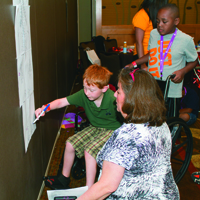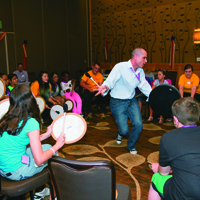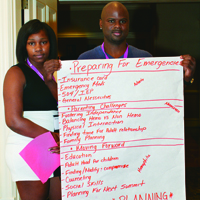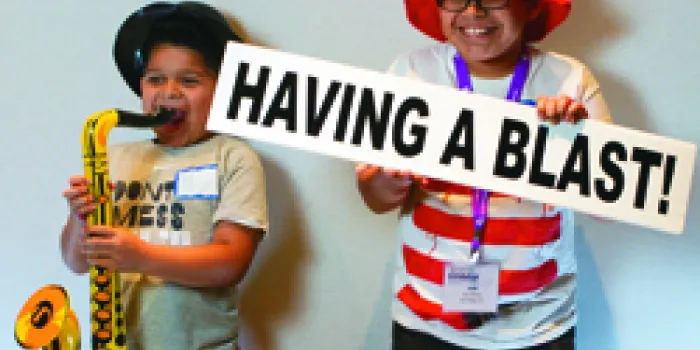For some parents of children who have hemophilia with inhibitors, the National Hemophilia Foundation’s (NHF’s) Inhibitor Education Summits offer something they rarely experience elsewhere—a chance to speak with other parents on similar journeys.
“I love to see my ‘inhibitor family’ again,” says Derek Nelson of Kaysville, Utah, who has a son with hemophilia with an inhibitor. “There is not another event where I feel as understood as I do here.”
Hemophilia affects approximately 20,000 people in the United States. People with hemophilia who develop an inhibitor—an antibody to infused clotting protein making it ineffective—are a small subset of an already small group. Approximately 25% of people with hemophilia A develop an inhibitor; for hemophilia B, between 1% and 4% develop one.
In 2013, NHF held three summits supported by an educational grant from Novo Nordisk. For Spanish-speaking families, there was a summit in Miami, held May 31 to June 2; for English-speaking families, summits were held in Seattle, July 11–13, and in Nashville, Tennessee, July 25–27. The Seattle and Nashville summits offered four educational tracks, including an introductory track for parents of newly diagnosed children; an intermediate track for more experienced parents; an adolescents-only track for young men and their siblings, and a track for adult men.

Peg Geary, MA, MBA, MPH, LCSW,
CCM, of the New England Hemophilia
Center, watches as a boy identifies
the location of his target joint.
People with hemophilia with inhibitors experience more bleeds, joint damage, arthritis and other complications than their peers. The educational sessions—staffed by doctors, nurses, physical therapists and social workers familiar with inhibitors—helped address those complications. Topics included treating difficult bleeds, early treatment of bleeding, an Ask the Expert session on orthopedic surgery and individual sessions on specific target joints: ankles, knees and elbows.
The summits also addressed the mind and heart, offering opportunities for people to unburden themselves and share their stories. There were Mom-to-Mom and Dad-to-Dad discussion groups. Smaller breakout sessions helped single parents, teens, siblings, partners and spouses, and grandparents. There were also sessions for individuals and their caregivers on managing the stresses of a difficult chronic condition, including such topics as spirituality, sibling issues, stress management and music therapy.
 |
 |
| Music therapist Tim Ringgold, MT-BC, gave two sessions on using music to manage pain. Here, kids keep the beat at the Seattle summit Youth Camp. | Nashville summit participants show off their preparedness plan during the Family Dynamics of Inhibitors session. |
For many families, the chance to have educational content designed for their unique needs is a blessing. “Each year, I leave with more hope than when I arrived,” Nelson says.

